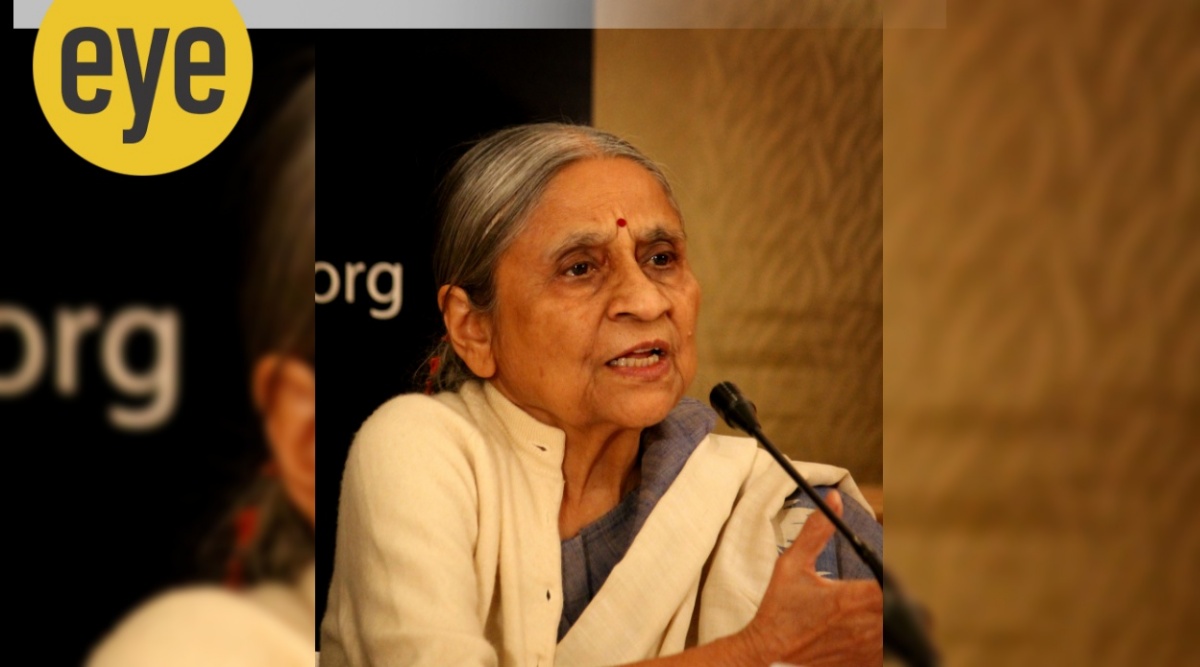 Ela Bhatt passed away on November 2. (Source: Express Archive)
Ela Bhatt passed away on November 2. (Source: Express Archive)Ela Bhatt has been part of my life almost since Dastkar’s beginning in the ’80s. I had the fortune to see her in multiple roles — not just as the founder and head of SEWA, but as homemaker, wife, mother, mother-in-law and grandmother. A teacher and mentor, but also a perennial seeker of truth; nurturing and exemplary always. Her grandsons, both creative, were encouraged to scribble on the walls of her home!
Ever welcoming, she loved meeting new people and learning new things. Much of our conversation and correspondence were about Indian social history, and how it shaped our lives and thinking. She was delighted to discover the Gandhian links between our families. “I remembered you while visiting Dandi and particularly Dharasana, where your granduncle Abbas Tyabji was leading the salt satyagraha as Gandhiji got arrested in Dandi,” she wrote, “My grandfather also was at Dharasana, beaten and arrested. He was leading the first team of the satyagraha. I wanted to share this with you.”
Something else she shared, which is so eloquent of her as a person, was concerning the day she left the SEWA office after giving up her post as general secretary in 1996, a role she’d had since its inception decades before. After the emotional goodbyes, she was feeling rather flat, wondering what the future held, what she would do. Suddenly inspired, she directed the driver to go to the home of a music teacher she knew, and signed up for singing lessons! Thereafter, Indian classical singing became an important part of her life (as yoga was). Needless to say, she remained as busy as ever, on the national and international stage.
Elaben was an activist and a feminist, well ahead of her time and milieu. She was a lone voice in the trade-union movement in Ahmedabad in the 1960s, when her engagement with unorganised women workers in the Ahmedabad textile industry began. She saw the importance of their contribution to family incomes, and the appalling conditions in which they worked. Be they rag pickers or casual labour, they were unorganised, unrepresented and had no voice. Her legal training (she was an LLB) and her experience as an educator (she had taught English at SNDT University) equipped her to be their advocate. The unions’ opposition to the inclusion of unorganised women led to the founding of SEWA in 1972 and its growth into the movement of 2.1 million women workers in 18 states, that it is today.
Elaben’s advocacy was never strident or loud, nor was she an impassioned orator. She remained a gentle revolutionary, though never passive. All the more effective because what she said was never about herself, but as the spokeswoman for thousands of women who had no voice of their own. As she said herself, “Jay beeja nay aagad karay te aagewan (those who put others forward are leaders)”.
As the simplicity of her habitual khadi saris showed, she was a Gandhian, a word often misused and often slightly dismissive. There was nothing naive or woolly about her Gandhi-ism. It was, like the Mahatma’s, practical and focussed. The vision was always partnered by an action plan. When something didn’t work, she rethought it. The post-Godhra killings and increasing communalism in Gujarat wounded her spirit, but, inspiringly, she remained an optimist till the end.
Gandhi used the handspun and handwoven as a metaphor for independence and swadeshi; Elaben used a clay pot. Buy locally, use local resources, become sustainable, empower local communities. “Poverty is a form of violence,” she said often, “Poverty is a society’s disrespect for human labour.”
As Dastkar worked with SEWA over the years, first with block printers in Ahmedabad and then the rural-mirror work, patchwork and aari-embroidery women in Banaskantha, she was quick to agree that poor women need not make cheap things. Whatever we created should reflect the full potential of their skills, and they should be paid accordingly.
She had great empathy with the women and, also, with their rich cultural heritage and skill sets, something they themselves often didn’t value. “Her work is part of a woman’s identity — her life, her family, her community, her religion, her faith, her person and identity,” she said. We shared our belief that “Traditional crafts are not our past; they are our future.”
My enduring memory of Elaben is one I saw many times — a small neat erect figure, clad in her trademark khadi sari, elegant but understated, backpack on her back, walking firmly through the airport doors, on to yet another international conclave, yet another coming together of disparate people, yet another destination, sharing the message of equality and the power of women, sharing her gentle strength and inspirational spirit. Her journey is not yet done.
You want some people to live forever. In fact, you need them to.
Laila Tyabji is founder member and chairperson Dastkar Society for Crafts & Craftspeople.